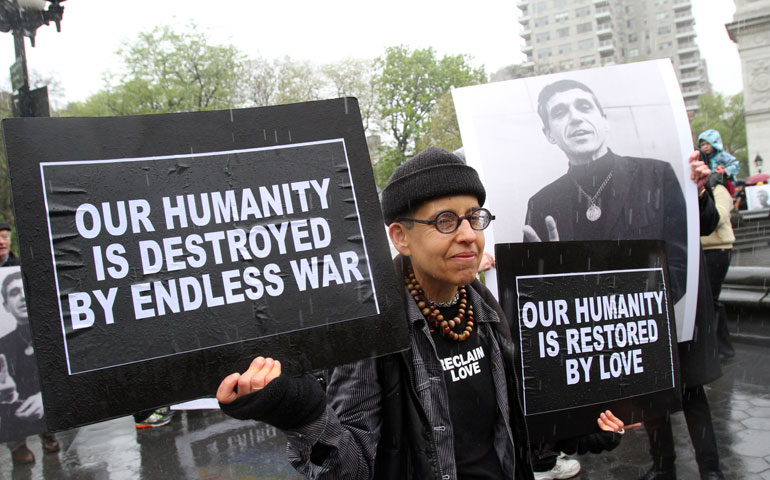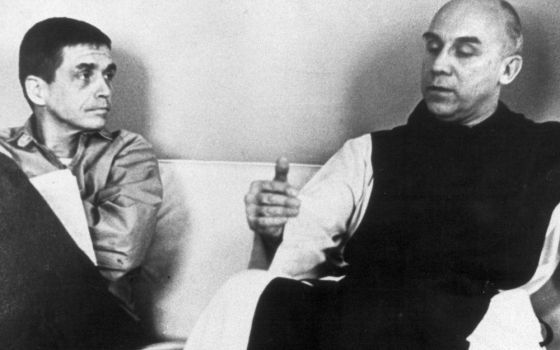
A mourner carries signs as she participates in a peace march May 6 prior to the funeral Mass of Jesuit Fr. Daniel Berrigan at the Church of St. Francis Xavier in New York City. (CNS/Gregory A. Shemitz)
Much like Gandhi, Dr. Martin Luther King Jr. and Dorothy Day, Jesuit Fr. Daniel Berrigan never set out to radicalize his life by resisting state violence and being jailed for it. Gandhi trained in England, envisioning life as a lawyer. King, after earning a doctorate in systematic theology from Boston University in 1955, planned on pastoring a Baptist church. For Day, carousing in Greenwich Village in the 1920s, it would be journalism.
Came then soulful conversions.
Little in Berrigan's 13 years of Jesuit training, ending in 1952 with ordination, gave hints that he would stray from the tame, cassocked paths trod by most members of his order. For him, it looked to be education. In the mid-1950s, he taught at Brooklyn Preparatory School where one of his brighter students was Robert Bennett, a future titan of the Washington bar whose clients would include Pentagon hawks Caspar Weinberger and Paul Wolfowitz.
What wind swept Berrigan away from the conventional classroom toils he seemed marked for? It was his younger brother, Philip.
In a 1978 letter, Daniel wrote to him: "I saw the Jesuits yesterday AM at Detroit U pushing their golf bags ahead of them to a car, off for the day. It was a fractured scene out of the 40s and 50s. I thought, there but for you, went I. What a blessing to be beckoned along so gracefully. ... For standing while others wilt + whimper + waste it, for speaking up while others hum along -- thank you dear brother."
Philip had been a World War II soldier. "I was a very good killer," he once wrote.
Before Daniel became a hardcore dissident, Philip was deep into it as one of the Baltimore Four, who on Oct. 27, 1967, when the Vietnam War was nearing its height, destroyed 1-A draft files at a Selective Service office.
It was a warm-up practice run for the similar Catonsville Nine action on May 17, 1968, when more draft files were destroyed. Philip, a recidivist, was sentenced to six years in federal prison. Daniel, a first offender, received three.
Of the event, Daniel wrote: "Our apologies, good friends, for the fracture of good order, the burning of paper instead of children, the angering of the orderlies in the front parlor of the charnel house. We could not, so help us God, do otherwise. For we are sick of heart, our hearts give us no rest for thinking of the Land of Burning Children."
Before his death April 30 at 94, which was 14 years after Philip died at 79, Daniel would write more than 40 books, ones graced with serene prose enriched by metaphors and poetic allusions.
All the while, his influence grew. In 1980, he and Philip formed the Plowshares Movement, a wide-ranging coalition of pacifists ready to battle the American Empire and its war-making addictions. In its first seven years, some 20 Plowshare protests occurred -- with no acquittal in any trial.
Most Catholics bishops, cuffed to their orthodoxies and aware that Catholicism is not a pacifist church, stayed clear of Daniel Berrigan. An exception was Bishop Walter Sullivan, whose 36,000-square-mile diocese of Richmond, Va., included the Norfolk Naval Base.
In the 1996 book Apostle of Peace: Essays in Honor of Daniel Berrigan, Sullivan tells of being harassed by members of his flock in 1970 for inviting the felonious cleric to stay at his home while in town for a lecture. "I discovered firsthand how hostile and unforgiving the majority of Richmond's Catholics were toward people who witnessed for peace by means of civil disobedience. ... 'A priest should not be in politics,' they insisted. 'This Father Berrigan is a disgrace to our religion. Why don't the Jesuits do something about this wild man?' "
In sad fact, they did. At the demand of New York Cardinal Francis Spellman, an avid supporter of the Vietnam War who enjoyed blessing bombers, the cowed order exiled Berrigan to Latin America to cool off. It failed. His work in the slums and the contrast between American war-making and Latin American poverty only radicalized him further.
Of the several times I met with Dan, the most memorable was in late 1966 when he volunteered to teach English to the children of migrant workers in Colorado in the federal Upward Bound program. He visited Washington, invited by Sargent Shriver, director of President Lyndon Johnson's poverty program, to report on his work. The Vietnam War budget was rising and the poverty budget was falling, severely.
"The poor have it hard," Dan said at a Shriver staff meeting, "but the hardest thing they have is us."
He was right then and is right now.
[Colman McCarthy directs the Center for Teaching Peace in Washington, D.C. His recent book is Teaching Peace: Students Exchange Letters With Their Teacher.]

